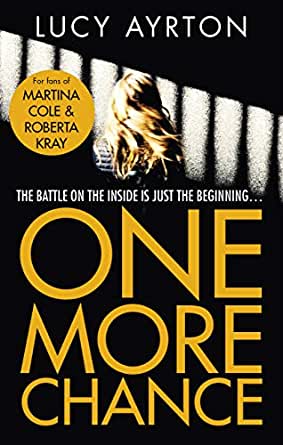We interviewed One More Chance author Lucy Ayrton about basing a thriller inside a prison...

1. What's the idea behind your debut novel, One More Chance?
The story is about Dani, resident of HMP Holloway and mum to Bethany, her toddler daughter who’s been taken into care. Dani gets a mysterious new cellmate who offers her a chance to see her child again, but it’s not clear if she can be trusted.
2. How does the setting of a prison influence the story? As a communications manager of a prison charity, you clearly have a lot of knowledge about the prison system. How did these real-life experiences from your career fuse into your writing?
Prisons are chatty places and a lot of the incidents in the books are based on things people have told me about their prisons – all the escape stories I mention actually happened, and the details about getting drugs in and prison protocols were all really useful and rich pieces of story to include. It also left me with a lot of political opinions about prisoners, particularly women. I think that prisoners are disproportionately demonised, and I wanted to write something to address that. My Dani’s no saint, but she’s a person not a monster – just like the prisoners I’ve met.
3. Redemption is at the heart of your novel; how do you go about creating a character who readers will root for? What would be your top tips for writers looking to create an authentic voice for their protagonist?
As we’re such a small office in my prison charity, we all do a bit of everything and I often end up opening the post and reading prisoners letters to us, which are often very personal, sometimes very sad. I pretty much always find myself rooting for the people who write to us – it’s hard not to when someone’s real to you, and when they’re being honest with you about their hopes and fears. Being immersed in the stories of so many people like Dani and seeing how people dealt with problems like the ones she faces made it easier to build her in an authentic way. So I suppose my tip is – research! Try and find the voices of people like your character and read them as much as you can.
4. Amongst other themes, you look at female friendship and all its complexities in One More Chance. What was it that drew you to explore this?
I feel that female friendships can be easily as important as romantic relationships, but we don’t talk about them nearly as much. But they can enrich or upset your life hugely. It’s so weird, for instance, that we don’t really have a way to end a bad friendship the way that we do a bad relationship – or a way to declare it special, like a marriage.
5. Do you have a writing routine? If so, what does a typical writing day look like for you?
I work in my day job three days a week, so on those days I’ll try and get an hour to write, either by getting up early or going to a café after work (this doesn’t always happen). On my two “writing days” I work 9-5ish, usually with a gym break at lunchtime to clear my head. On Wednesday afternoons I go to a local pub with two other writer friends and we work until happy hour kicks in at 5pm, then have a pint, which is my favourite time of the week.
6. How was the process of finding an agent for you? Do you have any tips for writers who are about to embark upon the submission process?
It was quite a long process! I had three “rounds” of looking for an agent, with changes to the manuscript between each round. The first round I got no responses, the second round had some full manuscript requests and on the third round I found Laetitia (Laetitia Rutherford at Watson, Little). My tip would be to do it extremely systematically. I had a proper spreadsheet with dates when I could send follow ups and reasons why I’d approached that particular agent… I went about it very much like job hunting.
7. You’re also a performance poet; has writing poetry influenced the way you tell a story in fiction form?
I think it makes voice extremely important to me – voice was very much my way into the character of Dani. Details of her appearance and biography came a bit later to me, but I couldn’t start writing her until I knew what she sounded like, and I think that came from performance poetry.
8. If you could give one piece of advice to your unpublished self, what would it be?
Care less about getting it wrong – you can always fix it later.
Comments